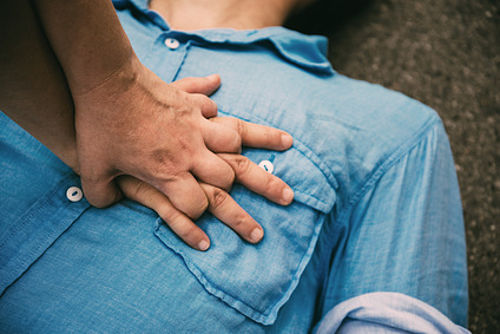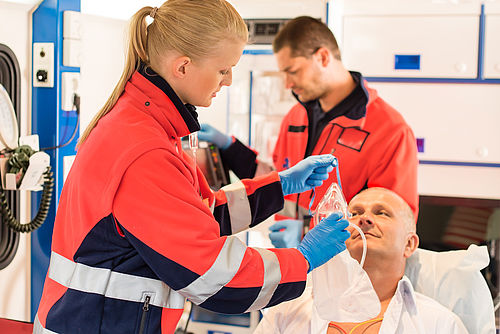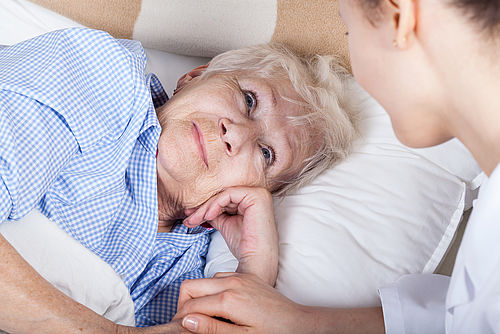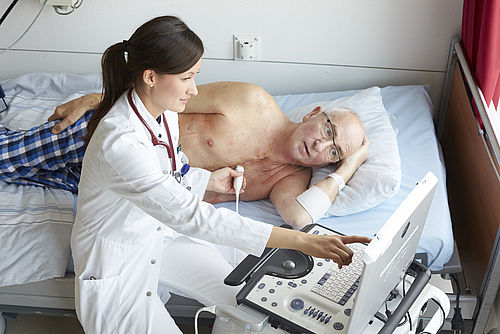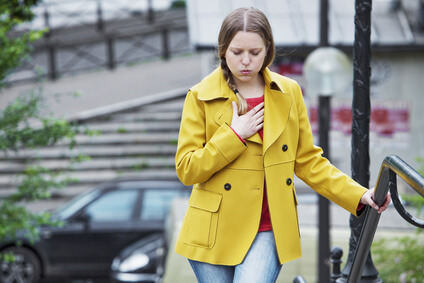Sudden Cardiac Death
Sudden cardiac death occurs quickly and usually completely unexpectedly. Approximately 65,000 people in Germany die from it every year. This is 20 per cent of all deaths caused by cardiovascular diseases. After a severely abnormal heart rhythm develops, a cardiac arrest follows within minutes. During a cardiac arrest, a person loses consciousness and their normal breathing stops.
Therapy
There is only a chance of survival if treatment is started immediately. For every minute that the heart is stopped, a person’s chance of survival drops by ten per cent. After initially calling for emergency services, chest compressions and possibly mouth-to-mouth resuscitation should be started. If available, a defibrillator should also be used. These devices emit electrical impulses that can bring the heart back to its normal rhythm. Emergency services will care for someone on site and transfer them to a hospital where the treatment is continued.
If someone survives a cardiac arrest, the next course of treatment depends on how quickly they were revived. For example, severe brain damage can occur if too much time passes until successful resuscitation. To prevent another cardiac arrest, patients are implanted with a defibrillator. When cardiac arrhythmias occur, these small devices send out electrical signals to treat them.
Causes
In principle, sudden cardiac death can be caused by any disease that triggers heart arrhythmias – for example, diseases of the blood vessels of the heart, which usually affect middle-aged people. In 80 per cent of cases, arrhythmia is triggered by an unforeseeable heart attack. Other causes include arrhythmias caused by heart muscle diseases and congenital heart defects. In only about 13 per cent of cases, cardiac arrests occur in known high risk groups. These include people who have had a heart attack that has led to significant heart failure and people with other known heart diseases who should be fitted with an implantable defibrillator, according to current guidelines.
It is predominantly older people who are affected by sudden cardiac death, but young people can also be affected. Often, this is due to an unknown congenital heart disease that leads to sudden cardiac death under heavy physical stress, such as competitive sports.
The best prevention of sudden cardiac death is to have regular examinations of the heart to detect and treat possible diseases at an early stage.
DZHK studies on sudden cardiac death
The DZHK wants to achieve that cardiovascular diseases can be better detected and treated. Clinical studies are indispensable to achieve progress in this area. This is why the DZHK supports this research.
TOMAHAWK-DZHK4 – Immediate unselected coronary angiography versus delayed triage in survivors of out-of-hospital cardiac arrest without ST-segment elevation
SMART-MI-DZHK9 – Implantable cardiac monitors in high-risk post-infarction patients with cardiac autonomic dysfunction
Research News
Heart muscle in the test tube: best possible therapy for new forms of CPVT (24.07.2023) Sudden cardiac death - who benefits most from an implantable cardioverter defibrillator? (19.11.2019) Maelstroms in the heart (22.02.2018)
Information regarding further Cardiovascular Diseases
Find information on the most important cardiovascular diseases researched at the DZHK and tips for their prevention.
Please note: The articles contain only general information and must not be used for self-diagnosis or self-treatment. They cannot replace a visit to the doctor.

